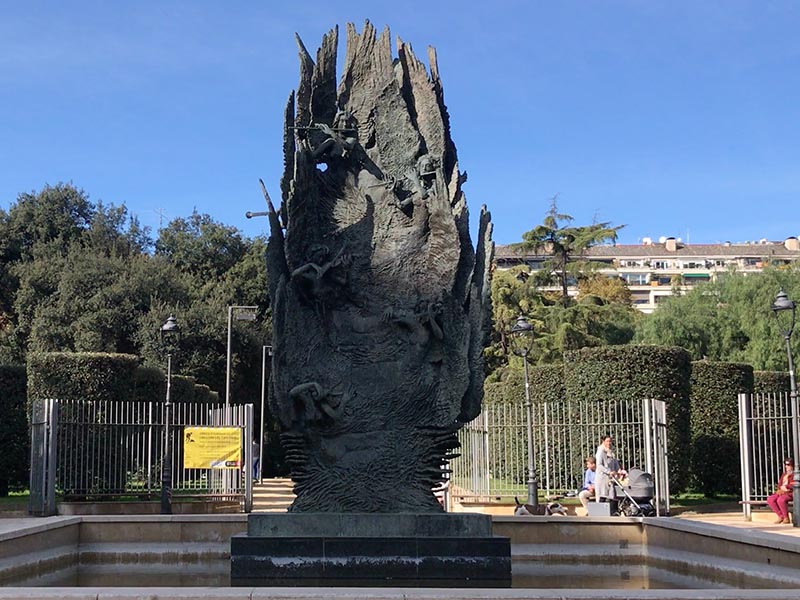Pau Casals
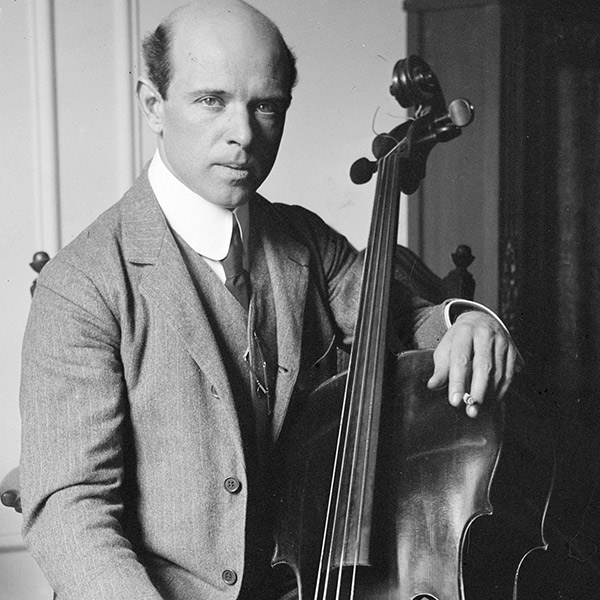
Name:
Pau Casals i Defilló
Occupation:
Conductor, Director, Educator
Born:
1876, El Vendrell, Catalonia
Died:
1973, San Juan, Puerto Rico
Instrument:
Cello, violin, piano, flute
Josep Maria Figueres discusses the legendary Catalan cellist. During the 20th century, Pau Casals is one of the most important musicians in the world. As a composer, a conductor, a creator. He’s someone who elevated cello-playing to an extreme, sublime level of art. He transforms it so completely. To musicologists, there is [cello] before and after him. Pau Casals is born in El Vendrell, a small town Mediterranean town, on the Catalan coast. He will go to Belgium, Paris, etc. to study. And rapidly, the adaptations he brings to this instrument inspire its reconsideration. Up to now, a certain rigidity surrounds the instrument. He liberates it, blows it up. His exigence, dedication, and virtuosity, begins in 1900 with Bach’s Cello Suites, and continues throughout his life. He practices daily, eaching a point where he’s not only clearing the dust, but articulating the composer’s vision. On musicologists’ radar, he is sought after by every concert hall in the world. On tour, he is among the most prestigious and best-paid artists. He holds performances in the United States, in South America, in Japan, in Africa, in Europe, etc. going on to practically inventing masters courses in Switzerland and Vermont. So he has the direct involvement. He will embrace the social commitment of the musician, recognizing that one mustn’t simply perform. One must see himself within the fabric of society. He will bear witness to times of upheaval, like the Russian revolution, World War I and World War II, the Spanish Civil War, Francoist Repression, and the Cold War. In this context, he makes a very unpopular decision. He will refuse performance requests as a protest against dictatorships. First, with the Russian dictatorship. Then, with the nazi and Italian dictatorships, and then with the Spanish dictatorship. Later, that will be extended to democracies that support Francoism. He will refuse to perform in the United States, in England, in France. Yet, having taken this position, this world-renowned figure still manages to perform at the U.N. three times. He receives numerous types of medals and is honored around the world. In this context, he is the coherent witness to an unjust world. He rejects war, injustice, wanting only freedom. It the weapon is silence, then he will be silent. During his first visit to the United States, he befriends Emma Nevada. Starting from San Francisco, he travels everywhere. His renown nets three performances for different presidents at the White Houses, most notably for President and Jackie Kennedy, but that’s just the tip of the iceberg. For a special concert during a visit from Puerto Rican governor Luis Muñoz Marín, Pau Casals is brought to the White House. This inspires a great bond with the United States. He will have a strong connection to the League of Nations, performing three concerts, earning multiple awards, among them, the Medal of Freedom. He will write and perform an anthem for the United Nations, among other things. His connection is profound. Owing to his love for the United States, when Kennedy is assassinated he immediately dispatches his condolences, adding a special message for peace, the ‘Pessebre,’ on a tour from Memphis to San Francisco. There are several cities in the United States that he visits over and over again. From 1955, he lives in Puerto Rico. Before that, with the exile after the Spanish Civil War, From 1939 to 1955, he lives in Prada, near the Canigó, at the edge of the Catalan frontier. From 1955 to his death in 1973, he is in Puerto Rico, helping to create Pau Casals music festivals, a symphony orchestra, and a music school. It’s also worth mentioning that, earlier, in Barcelona, he’d formed the Workers’ Concert Association, and the Pau Casals Orchestra. On top of that, there are also the international festivals held in Prada, that continue to this day, as they are still being held in Puerto Rico and Prada. Owing to his fame, Pau Casals becomes a symbol of the Catalan exile. He is beloved and his rigorous stance in support of democracy never wavers. In 1956, as the White Book of Catalan Culture is being edited in Buenos Aires, he is asked to write the preamble. And Pau Casals will remain steadfast in his lolalty to Catalans. Later, with the Pessbre, he delivers a speech, a message of peace, to the world. He wanted to bring music to children, to cultures around the world, to inspire peace and harmony.
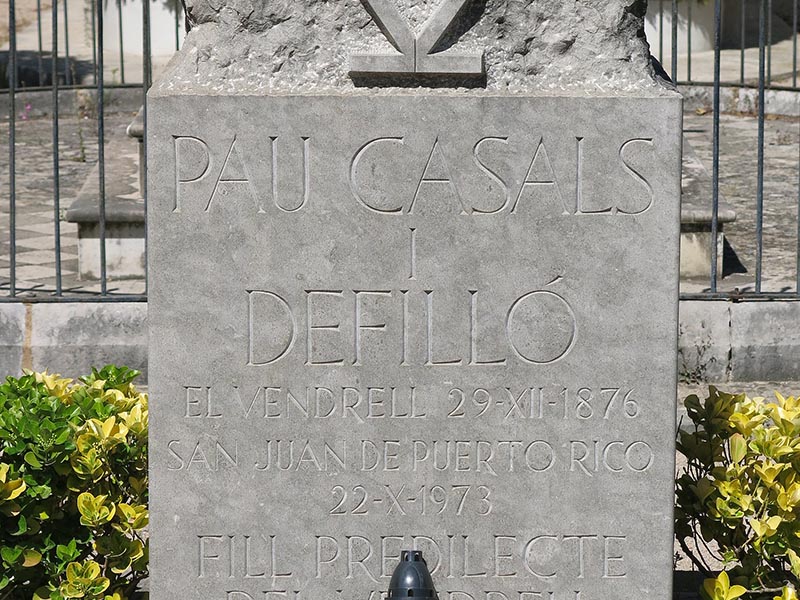
Tomb of Pablo Casals in Vendrell cemetery in Catalonia
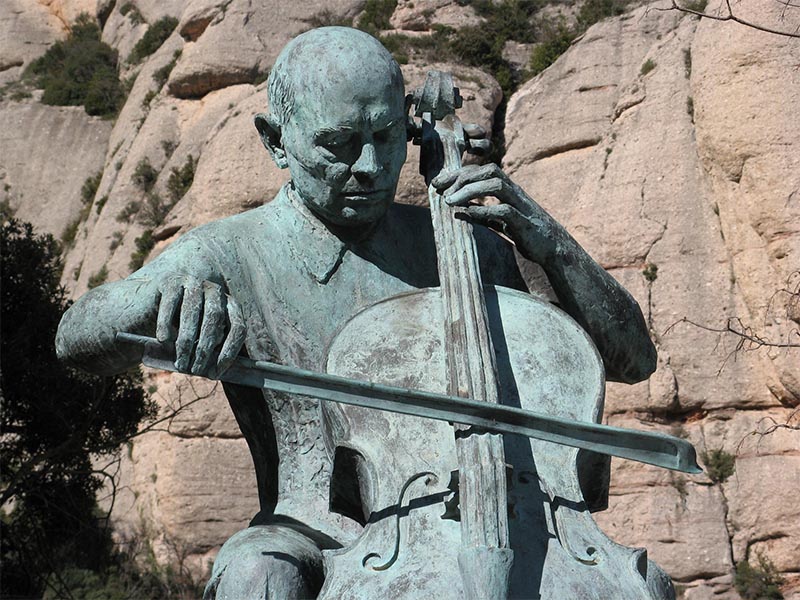
Statue of Pau Casals on Montserrat outside Barcelona.t giving a press conference.
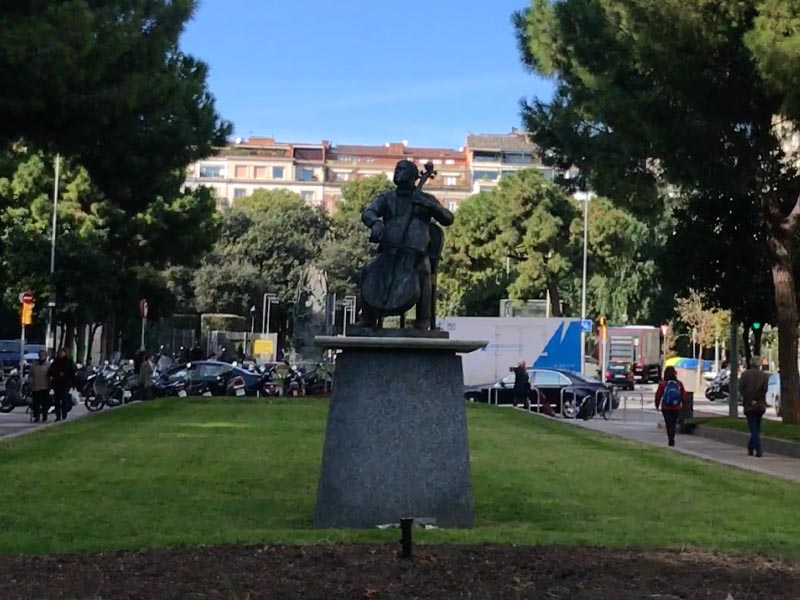
Statue of Pau Casals on Barcelona’s Avinguda de Pau Casals.
